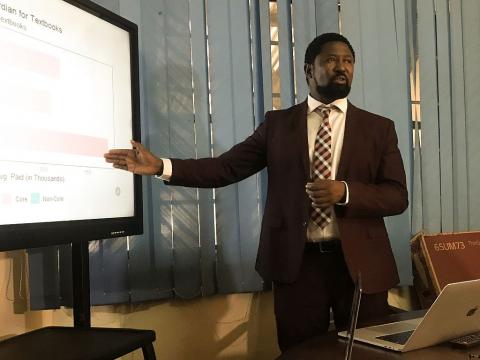Nasratu Kargbo
A report by the Institute for Governance Reform (IGR) has revealed that parents of pupils in both government and private schools spend more on education than the government in 2020 despite the Free Quality Education Programme in the country.
Speaking at the launch of the report on the 2nd November 2021 at their Wilkinson road office, the Executive Director of the IGR, Andrew Lavalie said the research which states that financing for both public and private school education for households in 2020 is estimated at 52% of overall cost on education in the country, was conducted based on 28 cost items, to know the contributions made by government and parents.
Lavalie explained that households spent 1.7 trillion Leones which is said to represent 39% of the overall cost of education on public school education while those that financed private school education spent 392 billion Leones which is equivalent to 13%; while the government invested 1.4 Trillion Leones which is equivalent to 48%.
He said even though the government has announced that core textbooks should not be paid for, their research revealed that “parents still pay”. Private schools have higher tuition fees and also pay more for all the 28 expenditure items, than government schools, except for arts and craft and food. The Executive Director stated that it is more expensive to educate a child in Freetown, Bo, Kenema, and Moyamba respectively than other areas.
Lavalie explained that government investment such as school buses was not captured in the report. He went on to explain that the report was taken to the ministry where concern was expressed that the cost reduced on parents in relation to the subsidy in transportation (school bus) was not captured in the report.
He recommended that government partners with CSOs to monitor schools to ensure that they adhere to laws, such as no bribery, stop ostracizing kids because they do not have gifts or arts and craft etc. They also recommended for the government to conduct a study on private school education, knowing the charges and the amount of kids, teachers and other expenses. That, according to Lavalie, will empower the government to engage with private school authorities on minimizing the cost of private school education.
Speaking on the methodology used, the Data Manager, Evan Trowbridge said they visited households, school administrators and the Ministry of Basic and Senior Secondary Education.
He said the aim was to know the cost on the government as compared to the cost on households, in order to know the overall cost of basic and senior secondary school education. He added that they also wanted to know what households are contributing to education and also the difference in expenses between government and private schools.
According to Trowbridge, samples were drawn from about 997 households and 1,828 pupils, of which 49% are from primary schools, 21% from Junior Secondary School, 12% from Senior Secondary School and 10% from pre-school. With regards location, he said 59 chiefdoms and urban locations were surveyed in all the 16 districts, with two rounds of data collection. All the data collected were based on 28 items such as tuition fee, shoes, books, uniforms, extra classes and transportation.The report according to the researchers was fully sponsored by IGR.
Copyright © Politico Online 03/11/21








